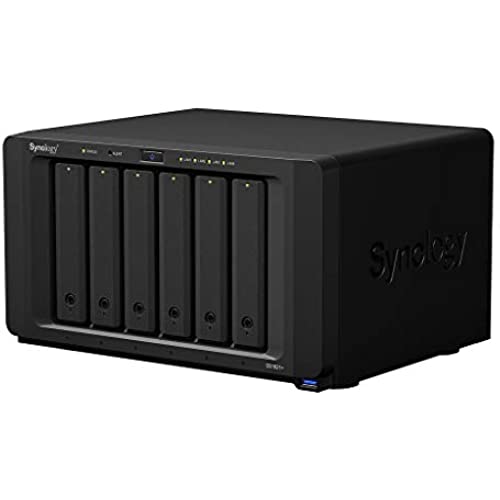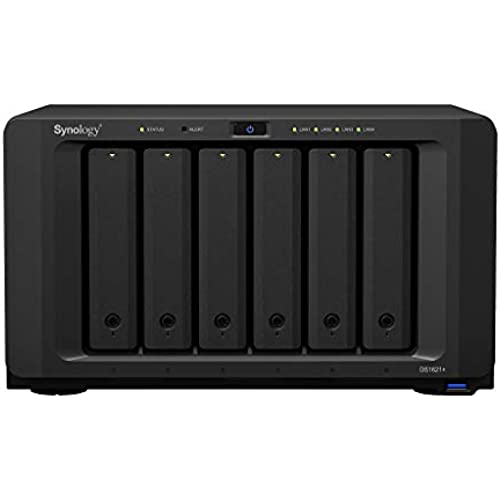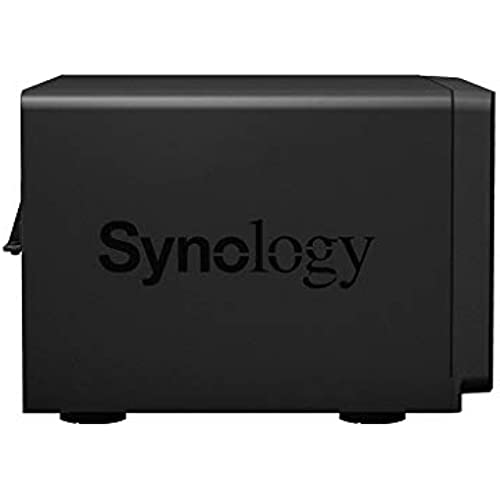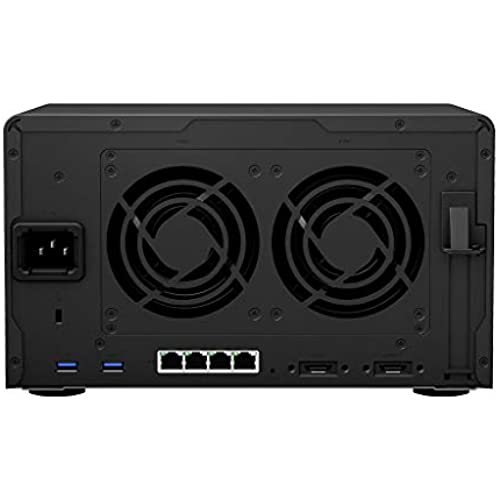

















Synology DiskStation DS1621+ NAS Server with Ryzen 2.2GHz CPU, 4GB Memory, 6-Bay, 72TB Bundle with 6X 12TB Seagate IronWolf
-

Christopher
Greater than one weekIve had this up and running for about a week and its been great easy setup and easy to use. Mainly use as a plex server and so far no issues.
-

Kou
Greater than one weekBeen eyeing an upgrade for a while, finally got this DS1621+ last week. Migration from my older DS416 Play was easy, took about 24 hours, but essentially automated. If no issues arise, I plan to use my DS1621+ for the next 10 years. The reasons I upgraded: 1. I just wanted to. 2. Expandable storage. 3. Better CPU (Ryzen quad core CPU). 4. 4 GB DDR4 (upgradeable). 5. NVMe SSD Cache. 6. Upgradable to 10 GbE
-

tanglapyan
> 3 dayWorks perfectly with x520 SFP+ Network card. Fast and stable NAS.
-

TexasDude
> 3 dayEverything works great. Love the Ryzen processor. I do recommend you get the memory upgrades. I got the 16GB, and the software seems to use excess RAM as disk cache so that is nice. I am so happy with it, I think I will go ahead and upgrade to 10Gb and NVME caches as well.
-

Midwest Guy
Greater than one weekSynology lags behind others when it comes to catering to power users. Sure there is a slightly better processor in thier newer NAS products but all they can give you is USB 3.1 Gen 1? Come on there! The very least you can do is give us USB 3.1 Gen 2. Very frustrating. Sinology does not seem interested in those users who need to transfer really big files fast. I guess I have to look at the likes of QNAP to get what I need.
-

Jose Santiago
> 3 dayI introduced myself to Synology back in 2015 when I purchased my first NAS, the DS1515+. Prior to this I used compaq servers over the years to provide reliable NW file storage. I like the Synology product as DSM is quite feature rich. I have an extensive background in NW and FS technologies so for me DSM was a nice fit with a minimal learning curve. Synology does a nice job at marrying HW, NOS and feature rich applications that dont require a-lot of tweaking to get running and fine-tune. Since then added the DX717 expansion and I am currently running 30TB of HD storage using both BTRFS and EXT4 FS. I was having some issues on the DS1515+ with BTRFS FS. I was unable to resolve issues with CHECKSUM errors corrupting files. After 6 years the DS1515+ chassis also would fail to power on at times after scheduled maintenance shutdowns. So, I decided it was time to replace the main unit and I did so with the DS1621+. All issues resolved at this time and BTRFS is rock solid. I like the snapshot abilities of this FS and its advantages over EXT4. I installed 2ea seagate NVMEs in a read/write cache utilizing RAID1 and the speed of my websites are breathtaking! Overall I am quite pleased with the DS1621+. I was expecting more out of the RYZEN CPU in respect to transcoding with PLEX and the reason I took 1-star off my overall review of this product. I did see quite the improvement in Surveillance station when scrubbing security videos on this platform. I run 10 HD cams running 1080P at 30FPS and this unit does so with minimum effort. This box defiantly outperforms the DS1515+ by far and the disk transfer rates are in par with the documented specifications. Hopefully Ill get another 6+ plus years of good use out of this product. I am running DSM 7 and I really like the changes and features in this version of DSM. The built in NVME slots provided me with 2 additional slots I can now populate with mechanical HDs for additional FS storage.BTW I recently upgraded my Apple TV HD devices with the Apple TV 4K units and transcoding demands on PLEX have dropped significantly. So at this time PLEX is able to stream all of my multimedia through out my NW seamlessly and reliably. Love it!
-

Susan norris
Greater than one weekThis is my second Synology NAS, I upgraded to the 1620÷ from the 1515÷ and could not be happier.
-

Wen G.
Greater than one weekI replaced my QNAP 9-bay ARM based NAS to this, cuz I needed to run home assistant but the ARM HA rom never worked somehow. X86 home assistant works perfectly fine on this Synology unit, but other than that, there are few things that I am not very satisfied with. First, the USB transfer speed was really slow, it supposed be usb 3.1 port but when I try to transfer file from a usb 3.1 external hard drive, it took almost 6 days to transfer 3.5TB files into the nas. I have tried with different usb 3.1 cable, all front and rear ports on NAS, they all ended up with same speed, I don’t know why. Another thing that bothers me is, if I don’t use it for a little while, when I try to open the network mapped drive from my computer, the explorer will freezes for a few mins, feels like the NAS in sleep mode and restarted, but to be honest the response time is more than powering on the NAS from completely off, and I have set it not to sleep or hibernate, kinda confused me, these issues never happened on my QNAP. Other than these, it works just fine.
-

WearAll Hats
> 3 dayFlexibility, 6 bays, setup fairly easy. I’m using 6 4tb drives giving close to 18tb avg. I’m using it on a win 10 network with 4 total NAS units. Speed and function were exactly as I expected. I store photos and data files all critical. I expect long service from the unit, drives will be changed around the 2-4 yr service life on a 24/7 cycle.
-

Nebti17
> 3 dayThis review is for the Synology DS1621+ Ive just finished getting my new 1621+ fully installed and up to speed. It took about three weeks to install all the software packages and figure all the settings out and though Im still thinking through some of the decisions Ive made, Im ready to write a review. I bought the DS1621+ to augment a QNAP TS-453-Be I purchased just under a year ago as a replacement for a QNAP TS-453 Pro which had its motherboard die. This is my second Synology--my first was a two-bay model which was my first NAS. I use my server for the following: 1) Plex server. Music only. And for this purpose the Synology is great. 2) Photo organization. I use Synologys photo organization software and Lightroom. I like running duplicate software because if one goes on the fritz, I can turn to the other. Synologys Moments AI photo organization software is good. Perhaps a bit less capable than QNAPs QuMagie, but close and Synology wont ever be far behind on software. 3) Backups of Windows and Mac computers through Acronis and Time Machine. 4) Virtual machine Windows 10 for when I need to get to something and Im not at my own computer. And for running the disk indexer X1 to have all my documents immediately accessible wherever I am. I never thought I would return to Synology after gettting a QNAP, but here I am with the 1621+, and I find myself preferring my Synology 1621+ to my QNAP TS-453-Be for a number of reasons. But first, let me say that on the hardware front, QNAP probably wins. Its close, but QNAP seems to give you more hardware for the price. For instance you can get 2.5GB ethernet, Intel chip, VMM-capable four-bay NAS from QNAP for less than the price of this 1621+ which is stuck at 1GB (unless you buy a PCIE card). Of course, the QNAP would be a four-bay model to the Synologys six bays, but the QNAP would have an HDMI port, more USB ports, an audio jack, and on and on. Hardware is QNAPs strength. The reasons for buying Synology: First, Synology has a better three-year warranty to QNAPs newly-revised-downward two years. And my first QNAP died a bad death last spring right after the five year mark (prompting my purchase of the TS-453-BE) while my original two-bay Synology still runs today, eleven years after I purchased it. In the end, I will take reliability over features, and I consider Synology more reliable. The second reason I went with this Synology is the constant problems with security QNAP servers have had over the last several years. Its hard to fault QNAP for being attacked, and theyve probably hardened their security--perhaps even beyond Synologys--as a result, but Ive left my QNAP unplugged for much of the last year because of the constant attacks their servers have faced. But the ultimate reason to get Synology is the software. Synology software is just a cut above everyone else, including QNAP. It feels bulletproof. Most important for me was the Synology disk system which treats all your hard drives--and they can be of varied sizes--as one large storage pool across the entirety of which RAID striping can occur. With QNAP, if you want to increase the amount of storage you have in your NAS, you must back up the NAS, replace all your hard drives, do a restore and go on with your newly increased capacity. You cant replace just one drive with a larger drive. You are limited to addressing in all drives just the amount of storage available in the smallest drive. Thus, if you have one 4TB drive and three 12TB drives in your QNAP NAS, maximum RAID storage would be 12TB, not 40 TB, because only 4TB of each drive could be used for RAID. Synology allows the use of drives of whatever size you wish, placing them all together into one large pool, all of which can be used for RAID striping. So in the above scenario, Synology would have 40TB available in RAID format for your use. This is a huge Synology advantage. I could say much more about Synologys excellent software, but Ill finish by recommending that you buy more RAM if you want to run virtual machines off the 1621+. I added a 16GB ECC RAM module for a total installed RAM of 20TB. I allocated 10GB of RAM to a virtual machine running Windows 10 and its fairly snappy. I bought ECC RAM here on Amazon which cost half the price of Synology RAM, and it works fine without any reporting of non-standard RAM. The RAM I bought is available here: https://www.amazon.com/gp/product/B07YXCBVWX/ref=ppx_yo_dt_b_search_asin_title?ie=UTF8&psc=1
